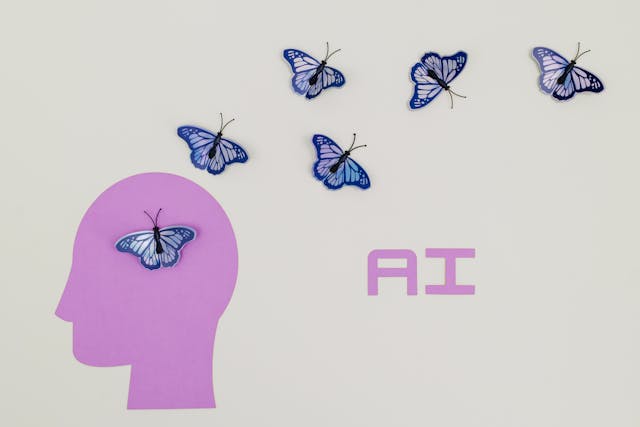
The Editing Company
Toronto, Ontario
RECENT POSTS
TEC Blog
Categories
Show All- Editing
- Grammar
- Usage
- Style
- Editor/writer
- Publishing
- Business
- Writing
- Writers support group
- Event
- Proofreading
- Copyright and permissions
- Usage
- Book reviews
- Editing new media
- Technology
- Books & libraries
- Ttc stories
- Editing & marketing
- Office happenings
- Social media & community
- Language & editing
- Social media
- Editing & marketing
- Indexing
- Book design
- Tec clients
- Guest blogger
- Creative women doing sixty
- Book clubs
- Books and reading
- Ebook technology & services
- Editing numbers
- Editing & technologies
- Opera, movies

4 Key Resources for Learning About AI: Self-Education for the Novice
by Lesley-Anne Longo
Published at 2024-04-02
In this blog, the last instalment in our blog series on artificial intelligence, we will be looking at some of the many resources available out there that can help us as editors and writers learn more about AI. Self-education, if you will, for the novice!
It can be really easy to get lost in the weeds when it comes to learning about AI and its related concepts. These technologies are not always explained in the most accessible way. The resources we’ve rounded up here are for those just starting out. Like us here at TEC, you may have a general idea of what AI is but may not be fluent in its terminology or deeper concepts yet.
But like all learning, once you’ve got the basics down, you’ll have the know-how to continue learning about the aspects of AI that interest you.
AI Editing: Tools to Improve Every Workflow (Webinar)
This webinar from Editors Canada is a great starting point for editors (and even writers). It outlines the AI tools that are not only available but how they work and what they can do for your editing practice.
The first part of the webinar covers how to edit and work with AI-generated text/content, and also discusses the limitations of these tools and what the issues might be.
The second part discusses how these AI tools can work for you and includes demonstrations of workflows and features.
Coursera
Coursera is a US-based open online course provider. This company works with universities and other organizations to offer online courses, certifications, and degrees in a variety of subjects, including AI.
A great option for beginners when it comes to Coursera’s AI offerings is “Introduction to Artificial intelligence (AI),” created by IBM. This course does not require any programming or computer science expertise and is designed to introduce the basics of AI to anyone whether you have a technical background or not.
The course teaches the basics of AI—what it is, its uses and applications, its related concepts and terms, and the issues and concerns surrounding it. As part of the course, the program asks you to submit a small project that demonstrates AI in action.
If you’re looking for ways to apply AI in your small business or organization, another great option is “AI for Everyone.” This is a non-technical course that will cover what AI can and cannot do, define common AI terminology, and help you spot opportunities to apply AI to solve problems in your own organization.
YouTube
YouTube is great for learning about…well, pretty much anything! How to build a deck, how to program your smart TV, Microsoft Word tips and tricks, and many, many more videos are available on YouTube—and there’s also great content for learning about AI.
Simplilearn
A good video for beginners is this AI tutorial from Simplilearn’s channel. It covers the basics and provides examples to illustrate the concepts it defines and discusses. It’s also not very long, so it gets you up to speed and familiar with the main terms quickly and efficiently.
The Royal Institution
Once you’re familiar with the core concepts, a video I found quite interesting is a lecture by Mirella Lapata featured on The Royal Institution’s channel. This lecture covers the topic of generative AI, which is a branch of AI that deals with using AI tools to synthesize and create new content, from text to photos to videos and more—even computer code.
A very informative follow-up to watch from the same channel is a lecture on the risks of generative AI. This is something we should all be thinking about as the abilities of these tools grow and expand.
Choose a Channel!
And again, there are videos on pretty much any topic you can think of on YouTube. So, if you’re looking for something specific, type in your search terms and see what pops up!
Podcasts
There are a few podcasts available out there that cover AI and its related topics. I haven’t checked these out personally. As a disclaimer, I would assume that you’d need to be familiar with the core concepts of AI to get the full value of these podcasts and the discussions they contain. So, just keep that in mind.
The AI Podcast
One of the most popular AI podcasts is, well, The AI Podcast. It has covered topics such as personalized healthcare using AI tools, using AI to fight wildfires, and the case for using generative AI in the legal field.
Each episode features a different guest sharing their story and being interviewed by host Noah Kravitz. The channel is definitely worth checking out, even if you just start with the episodes that are of personal interest to you.
Eye on AI
Another popular AI podcast is Eye on AI. This is a biweekly podcast hosted by long-time New York Times correspondent Craig S. Smith.
In each episode, Craig talks with some of the leaders making a difference in the AI sphere, putting seemingly tiny advances in machine intelligence into a broader context and considering the global implications of this developing technology. Definitely not for beginners, but if you’re more advanced in your AI learning or ready to take the next step, this could be a valuable resource.
Practical AI
If you are more of a beginner, you could try the Practical AI podcast.
This podcast focuses on making artificial intelligence practical, productive, and accessible to everyone. Each episode features technology professionals, business professionals, students, enthusiasts, and expert guests engaging in lively discussions about AI and its related topics. The focus sticks to productive implementations and real-world scenarios that are accessible to all.
Continue Learning!
We hope these resources will encourage you to take a deeper dive into AI and keep learning about this technology and what it can (or cannot do) for editors and writers. We feel that it is not only important to know what these tools can do but also to know what the risks may be, so that we use them responsibly and to their best effect.
Want a great tip in your inbox each month? Sign up for our enewsletter today!




